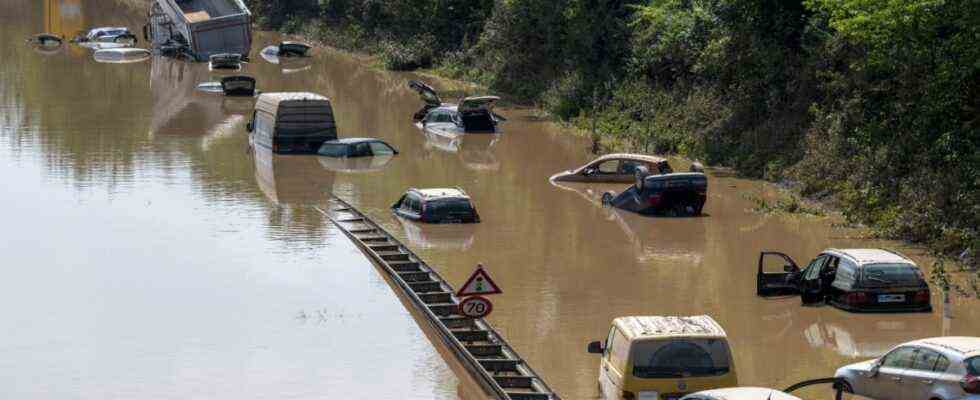Politicians were there, but there were no consequences. Anyone who expected that after the march in the flood area, climate policy would become the central issue in this so far strangely empty balloting election campaign in Germany, must realize: the wake-up call has faded, ducking away is the motto. When it comes to concrete measures, it is preferred to formulate vaguely or delegate.
Those were the days when the Greens campaigned in 1998 with a specific demand that the price of petrol should be raised to five marks – or 2.50 euros – per liter. At that time, they were more courageous to back up their convictions with concrete political proposals, and yet made the leap into a federal government for the first time. Now the green top politicians do not even dare to demand a ban on domestic flights, but prefer to speak of incentives to switch to the train.
The French government under Emmanuel Macron is daring – without any Green participation – that last week it announced a far-reaching ban on domestic flights, demanded a weekly veggie menu in canteens and introduced the new ecocide sentence with prison sentences of up to ten years. Something like that could have been expected from the German Greens, who act cautiously and hesitantly and now do not even react emphatically to the flood disaster.
The Greens prefer to leave the demand for a ban on SUVs in city centers to the left, who say they are greener than the Greens and want to achieve climate neutrality after 14 and not 20 years. Not even a speed limit on German autobahns is publicly made a coalition condition by the green top staff. The election manifesto appears to have been softened so as not to create too high hurdles for participation in government or to deter potential voters.
In a recognizable effort not to do anything wrong (anymore), Chancellor candidate Annalena Baerbock appears as little as possible. That connects them with Armin Laschet, who did not even want to answer a question on ZDF whether the federal government should not strive for climate neutrality as early as 2040, like Bavaria, with a yes or no, but rather avoided a clear answer. The Union’s candidate for chancellor looks like a writhing itinerant preacher.
For clear text, the prevented Chancellor candidate Markus Söder feels responsible, who rushes forward again. Above all, the CSU boss knows better when it comes to others. When asked by the Bavarian Prime Minister to bring the coal phase out in the federal government by eight years, his colleague from Saxony, Michael Kretschmer, countered with the advice: Söder’s federal state did not hit it.
In fact, Söder misses action where he could do more – in Bavaria. The climate protection package presented by him does not contain any solar system requirements for new buildings that already exist in the green-black ruled Baden-Württemberg or in Berlin. Söder would also prefer to regulate this at the federal level. And the so-called 10H regulation, which has only been in force in Bavaria since 2014, according to which a wind turbine must be at least ten times its height from residential developments, has brought expansion to a standstill. Söder shrinks from overturning the restriction.
The citizens and many CSU local politicians in Bavaria are already further along. A referendum for the construction of wind turbines in the Ebersberg district received a majority, and residents in other communities such as Wülfershausen, Sinzing or the Rhön-Grabfeld region are also campaigning for wind power.
As the current German trend of the ARD shows, 81 percent of Germans see a very large or large need for action in climate protection – across age and party boundaries. Everyone can do something. Organic stores are seeing up to 60 percent more demand. But whether there will be a ban on plastic bags or not, that should be regulated by politics.
Organizations like Greenpeace do not hide the fact that in Germany they rely more on judges than on politicians when it comes to framework conditions. That is consistent. With its historic decision in April, the Federal Constitutional Court forced the government to adopt a more ambitious climate policy. Despite improvements, there are still no practical steps on the way to the goal of climate neutrality, and the SPD is also missing clear proposals here. Your candidate for Chancellor Olaf Scholz makes commitments for emergency aid – but long-term, concrete initiatives are necessary for climate protection.
The economy is – not least due to guidelines from Brussels – in many areas already further than politics, as also became clear at the SZ sustainability summit last week. Car companies are currently holding a kind of race to see who will be the first to get rid of internal combustion engines. But how many charging stations are available in the country and how they have to be distributed is a matter of politics, which has to set guidelines.
It will therefore depend on citizens and initiatives such as “Fridays for Future” to apply even more pressure so that the parties can finally come up with concrete climate concepts before election day. The Greens too.

